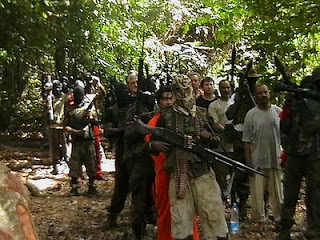-
Niger Delta Militants Escalate Attacks, Days After Government Establishes Ministry to Aid Delta’s Development
September 19, 2008 By Rachel WeisshaarNiger Delta militants destroyed Royal Dutch Shell’s Orubiri flow station on Tuesday and blew up a major oil pipeline near Rumuekpe on Wednesday, according to statements from the Movement for the Emancipation of the Niger Delta (MEND), the main insurgent group. On Monday, militants attacked other Shell oil facilities, killing a guard and forcing nearly 100 workers to evacuate. Clashes between the militants—who demand a larger share of the oil revenue and greater political autonomy for Niger Delta residents—and the Nigerian army have reduced the country’s crude oil output by more than 20 percent since 2006. The conflict is “perhaps the most significant, most volatile, and potentially dangerous in that part of the world,” says Wilson Center Africa Program Director Howard Wolpe, who is part of a working group formed to advise policymakers on the issue.
On Wednesday, MEND announced it was broadening the scope of its land attacks beyond Rivers state, the heart of the Niger Delta, and would also seek to target offshore oil rigs. On September 14, MEND declared an all-out war on the Nigerian government for the first time—only three days after its declaration of a cease-fire. The cease-fire came in response to the Nigerian government’s announcement of the creation of a new ministry to accelerate infrastructure development, job creation, and environmental cleanup in the impoverished region.Perhaps the declaration of both cease-fire and war within the space of three days is not so surprising, given the disagreement among Niger Delta leaders over the new ministry. In an online statement, MEND said,
The people of the region should receive this latest dish with apprehension and not allow the over five decades of starvation to rule our emotions as this is not the first time such ‘palatable’ offers have been served to the region from the late 50’s to date. Creating a ‘Ministry’ is not the coming of the much awaited messiah. Nigeria has in existence, ministries over 40 years old which have not positively impacted on the people. It will be yet another avenue for corruption and political favoritism.
Yet People’s Democratic Party Chief Okotie-Eboh had a different take: “It is a very good measure and it shows the sincerity of President Yar’Adua to resolving the Niger Delta crisis. We should give him a chance. This ministry will get allocations like other ministries to tackle the problems of the Niger Delta.”
Although views on the new ministry vary widely, all agree that the Niger Delta faces several grave security, economic, and environmental threats. For instance, an International Crisis Group report recently concluded that one “major issue that has to be dealt with in the context of reconciliation [between the Ogoni people and Shell] is environmental clean-up. No significant study has been conducted to determine reliably the precise impact of oil industry-induced environmental degradation on human livelihoods in the area, but there are indications of severe damage.”
Yet the Delta must also contend with the longer-term implications of its demographic challenge. Forty-five percent of Nigeria’s population is younger than 15, which amounts to a serious youth bulge. The government’s chronic inability to provide these young people with education, health care, and jobs is likely contributing to instability in the Delta.
Photo: MEND fighters and hostages. Courtesy of Dulue Mbachu and ISN Security Watch.
 A Publication of the Stimson Center.
A Publication of the Stimson Center.




